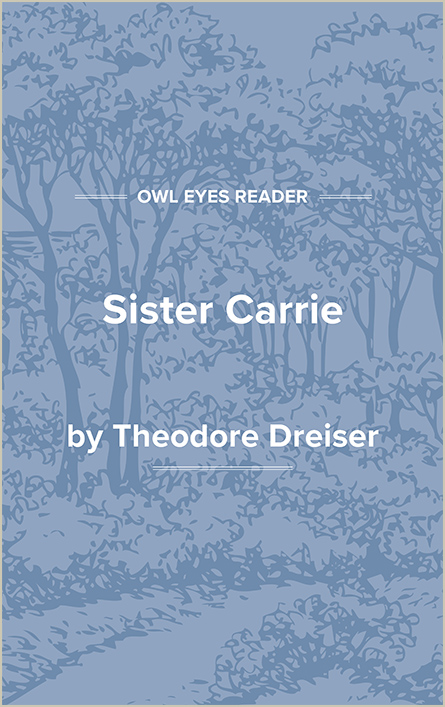Study Guide
Summary
Although Carrie Meeber, the protagonist of Sister Carrie, may seem somewhat shallow in her preoccupation with clothing and popular entertainment, she has been called a seeker of beauty. Carrie has grown up in an impoverished rural district, probably knowing only the essentials of life. To her, luxuries such as fashionable clothes, theaters, and elegant restaurants are beautiful things.
At first, Carrie plans to acquire material beauty through her own efforts, working in Chicago. She soon learns, however, that her lack of training and experience qualifies her only for factory work, which does not pay well. Following a bout of flu, Carrie loses her job in a shoe factory (sick leave did not exist in 1889) and cannot find another position. During one of her futile job searches, she chances to encounter Charles Drouet, a traveling salesman whom she had met on the train to Chicago. As Carrie is rather passive and pliable by nature, Charles easily persuades her to postpone her job search, have dinner with him, and let him buy her some nice clothes. Before long, Carrie has moved into this man’s cozy apartment, enjoying material comforts she has never known, without having to scrabble for work.
When Carrie meets George Hurstwood, the manager of a prosperous saloon, however, she realizes that this man is superior to her present lover. Not only is Hurstwood more intelligent, but also his clothes are finer in quality—a clear indication that he can provide her with a higher form of material beauty. Attracted to Carrie, Hurstwood plans an elopement to New York. In order to execute this plan, he needs a supply of ready cash—something he lacks because most of his money is in investments. This situation leads to a scene that exhibits Dreiser’s belief in one’s ability to weigh moral issues rather than only acting on impulse.
Closing the saloon one night, Hurstwood notices that the lock on the safe is not fastened. Tempted, he reaches in, takes out ten thousand dollars in bills, puts them back, then takes them out again. Aware that theft is intrinsically wrong as well as tremendously damaging to one’s reputation, he knows that he should replace the cash. Yet he hesitates, fondling the green paper that represents accessible spending power. Then an act of fate occurs that ends his conflict: The safe suddenly snaps shut, and he does not know the combination. Hurstwood decides to take the money but to send back most of it, retaining only enough to settle himself and Carrie in their new environment.
Once in New York, however, Hurstwood’s luck changes, as he cannot find steady employment. Carrie becomes a chorus girl, eventually acquiring speaking parts in comedy shows. While her salary is modest, it is sufficient to cover essentials, such as rent, coal, and groceries. Resenting what she interprets as Hurstwood’s laziness, however, and still on her search for material beauty, she spends all of her earnings on her wardrobe, so that the couple rapidly falls into debt. Eventually, Carrie and Hurstwood separate, and the latter, now homeless, commits suicide by gas inhalation.
In Sister Carrie , Dreiser shows his faith in the ability to change, as opposed to remaining in the “trap” of one’s origin or inborn personality. Although Hurstwood’s life ends tragically, he had exhibited progress in his youth. Starting as a bartender with little money, he worked his way into increasingly better positions, finally becoming the well-paid manager of a fashionable saloon. Carrie also changes—she loses her...
(The entire page is 905 words.)
Owl Eyes subscribers get unlimited access to our expert annotations, analyses, and study guides on your favorite texts. Master the classics for less than $5/month!

